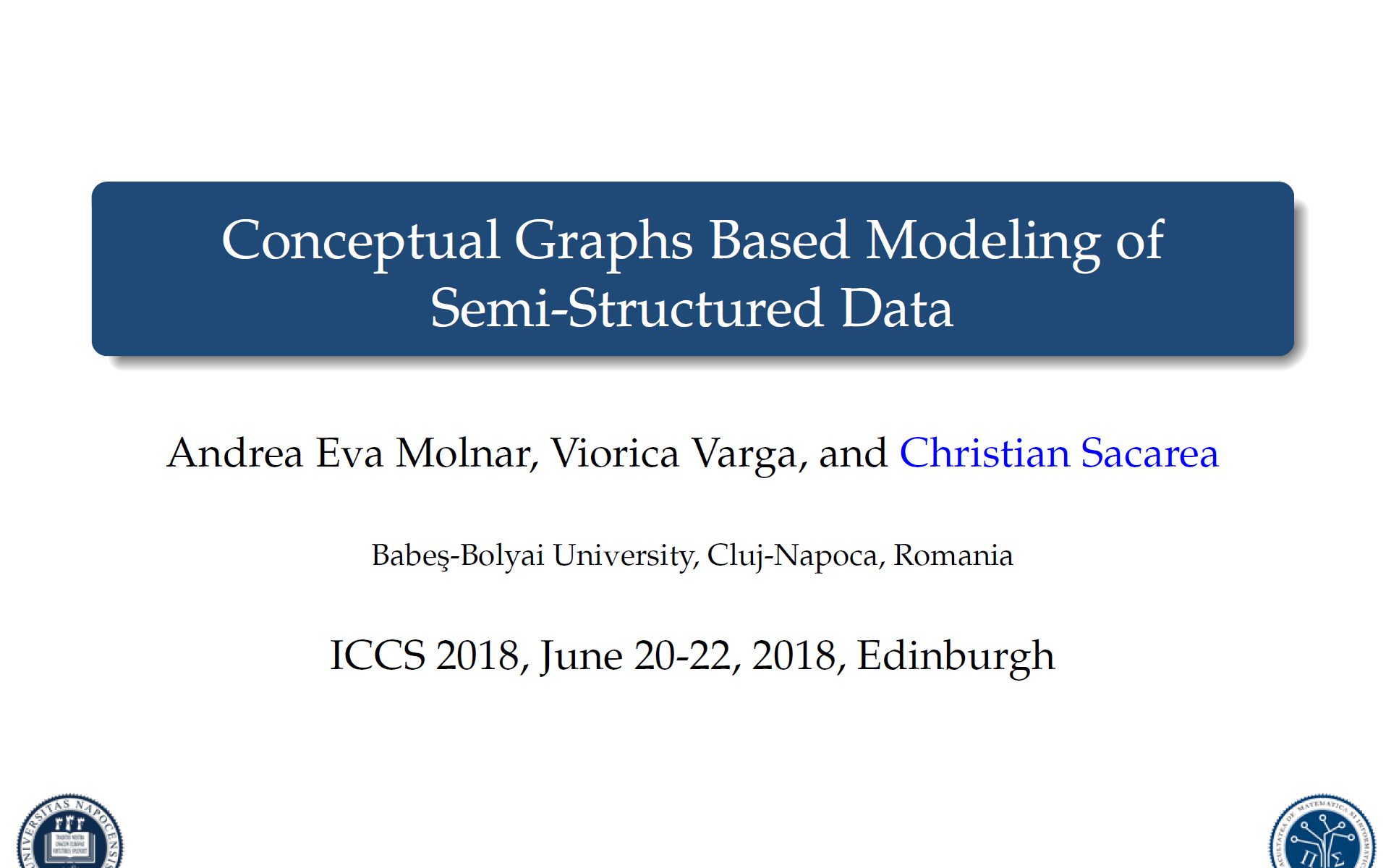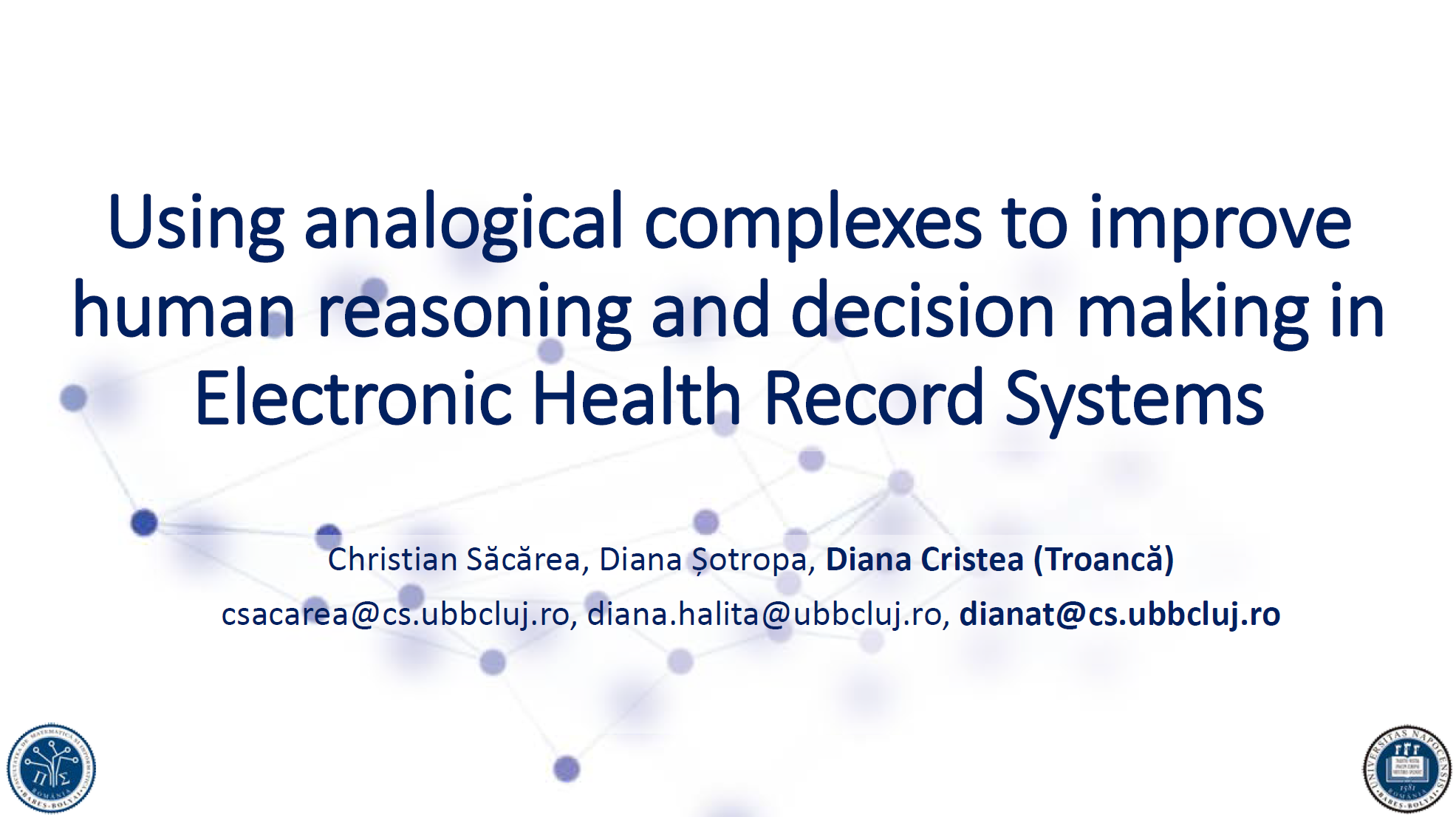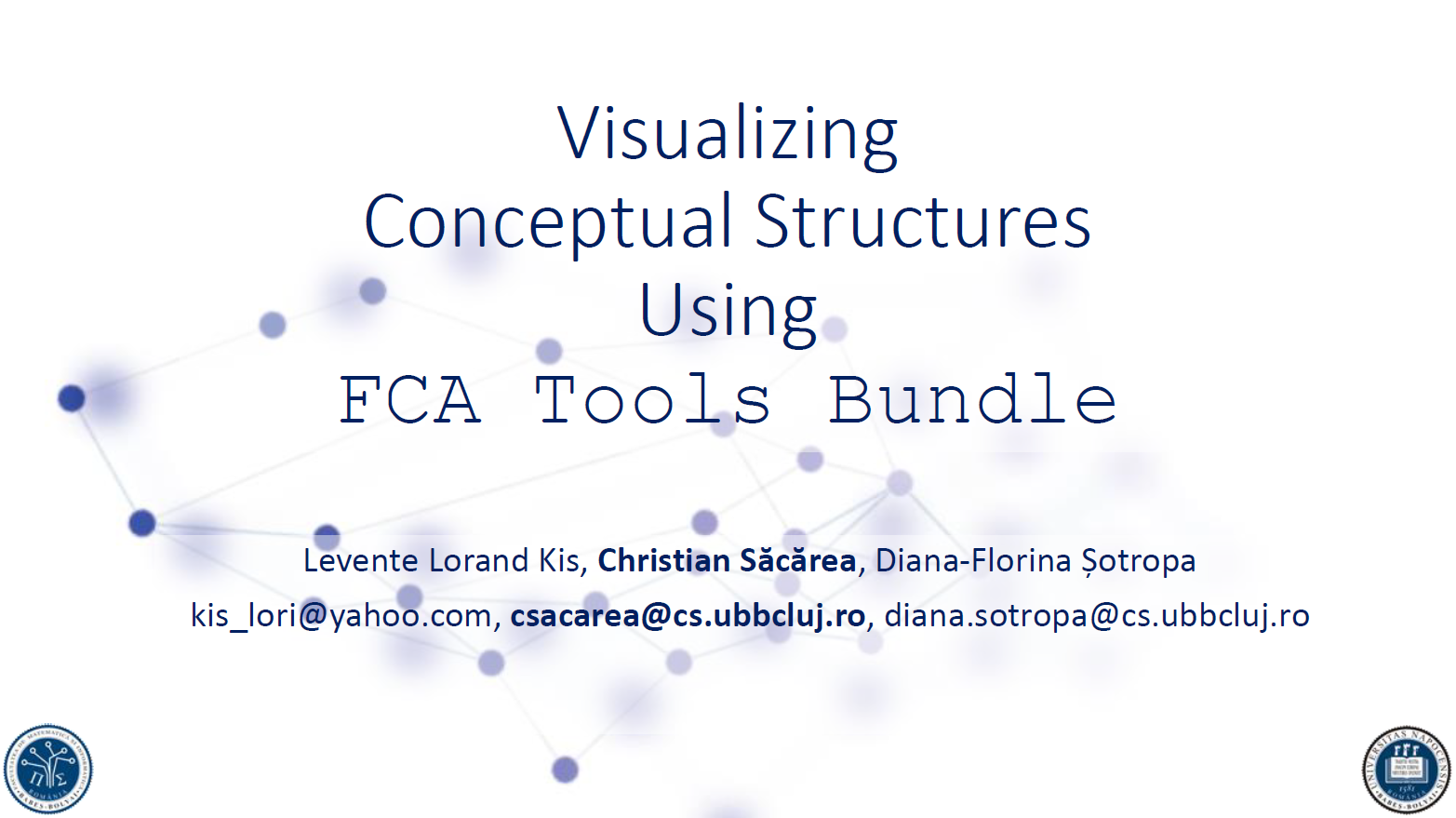Abstract:
Formal Concept Analysis (FCA) is a prominent research field having its roots in applied mathematics. Based on a mathematization of concepts and their hierarchies, FCA and its varieties have the potential to unify knowledge discovery methodologies. This paper is devoted to a summary of FCA applications in mining relevant conceptual landscapes from medical data. Electronic Health Records (EHR) constitute a significant technological advance in the way medical information is stored, communicated and processed. Digitized information systems are employed with the aim to improve efficiency, quality of care and costs. We are interested in combining different analysis techniques and visualization methods, such as analogical reasoning, FCA and graph databases in order to bring a fresh perspective over the medical process and to improve the task of knowledge discovery in EHR systems.
About
Activities
FCA Tools Bundle
FCA Tools Bundle is a website containing a collection of tools that can be used for conceptual structure analysis.
Research Seminars - Academic year 2017-2018
Usually the meetings are held in 406 room, 58-60 Teodor Mihali street, each Monday at 14:00.
Publications
Keywords:
Electronic Health Record, Knowledge Discovery, Formal Concept Analysis,
Using Recommender Systems to Support Navigation in Concept Lattices
Abstract:
Formal Concept Analysis (FCA) is a prominent field of Applied Mathematics grounded on the formalization of the notions of concept and concept hierarchy. Based on the expressive power of the graphical representation of knowledge clusters as order diagrams, FCA is an expanding field, rooted now mainly in Knowledge Discovery and AI. This paper is devoted to a new idea for concept lattice navigation, based on recommender systems and a local navigation approach. By this we overcome one of the main problems in this field and propose an intelligent navigation assistant through the conceptual hierarchy. At each step, the visualization is limited to a local view consisting of three levels in the concept lattice and a recommender system provides the necessary navigation assistance.
Keywords:
Formal Concept Analysis, Recommender Systems, Analogical Proportions, Similarity
Conceptual Graphs Based Modeling of Semi-Structured Data
Abstract:
Due to the fast growing of data in the digital world, not only in volume but also in its variety (structured, unstructured or hybrid), traditional RDBMS are complemented with a rich set of systems, known as NoSQL. One of the main categories of NoSQL databases are document stores which are speci
cally designed to handle semi-structured data, for instance XML documents. In this paper, we present a modeling method for semi-structured data based on Conceptual Graphs and exemplify the method on an XML document. The expressive power of Conceptual Graphs makes them particularly suitable for conceptual modeling of semi-structured data.
Keywords:
Conceptual Graphs, conceptual modeling, semi-structured data
Using analogical complexes to improve human reasoning and decision making in Electronic Health Record Systems
Abstract:
A key ability of human reasoning is analogical reasoning. In this context, an important notion is that of analogical proportions that have been formalized and analyzed in the last decade. A bridging to Formal Concept Analysis (FCA) has been brought by introducing analogical complexes, i.e. formal concepts that share a maximal analogical relation enabling by this analogies between (formal) concepts. Electronic Health Record (EHR)
systems are nowadays widespread and used in different scenarios. In this paper we consider the problem of improving EHR systems by using analogical complexes in an FCA based setting. Moreover, we present a study case of analogical complexes in a medical field. We analyze analogical proportions in Electronic Health Record Systems and prove that EHRs can be improved with an FCA grounded analogical reasoning component. This component offers methods for knowledge discovery and knowledge acquisition for medical experts based on patterns revealed by analogies. We also show that combining analogical reasoning with FCA brings a new perspective on the analyzed data that can improve the understanding of the subsequent knowledge structures and offering a valuable support for decision making.
Keywords:
Formal Concept Analysis, Analogical Complexes, Electronic Health Record Systems
Visualizing Conceptual Structures Using FCA Tools Bundle
Abstract:
Formal Concept Analysis (FCA) is a prominent field of applied mathematics organising collections of knowledge - formal concepts - as conceptual landscapes of knowledge. FCA proved to be a promising theory to extract, analyse and visualise conceptual structures arising from various data structures. One of the strengths of FCA is the elegant, intuitive and powerful graphical representation of landscapes of knowledge as concept lattices. The purpose of this paper is to present FCA Tools Bundle and its various features, which is a bundle of tools for dyadic, many-valued, triadic and even polyadic FCA.
Keywords:
Formal Concept Analysis, FCA Tools Bundle, Knowledge, concept lattice
Activities
FCA Tools Bundle
FCA Tools Bundle is a website containing a collection of tools that can be used for conceptual structure analysis.Research Seminars - Academic year 2017-2018
Usually the meetings are held in 406 room, 58-60 Teodor Mihali street, each Monday at 14:00.
Keywords:
Electronic Health Record, Knowledge Discovery, Formal Concept Analysis,
Using Recommender Systems to Support Navigation in Concept Lattices
Abstract:
Formal Concept Analysis (FCA) is a prominent field of Applied Mathematics grounded on the formalization of the notions of concept and concept hierarchy. Based on the expressive power of the graphical representation of knowledge clusters as order diagrams, FCA is an expanding field, rooted now mainly in Knowledge Discovery and AI. This paper is devoted to a new idea for concept lattice navigation, based on recommender systems and a local navigation approach. By this we overcome one of the main problems in this field and propose an intelligent navigation assistant through the conceptual hierarchy. At each step, the visualization is limited to a local view consisting of three levels in the concept lattice and a recommender system provides the necessary navigation assistance.
Keywords:
Formal Concept Analysis, Recommender Systems, Analogical Proportions, Similarity
Conceptual Graphs Based Modeling of Semi-Structured Data
Abstract:
Due to the fast growing of data in the digital world, not only in volume but also in its variety (structured, unstructured or hybrid), traditional RDBMS are complemented with a rich set of systems, known as NoSQL. One of the main categories of NoSQL databases are document stores which are speci
cally designed to handle semi-structured data, for instance XML documents. In this paper, we present a modeling method for semi-structured data based on Conceptual Graphs and exemplify the method on an XML document. The expressive power of Conceptual Graphs makes them particularly suitable for conceptual modeling of semi-structured data.
Keywords:
Conceptual Graphs, conceptual modeling, semi-structured data
Using analogical complexes to improve human reasoning and decision making in Electronic Health Record Systems
Abstract:
A key ability of human reasoning is analogical reasoning. In this context, an important notion is that of analogical proportions that have been formalized and analyzed in the last decade. A bridging to Formal Concept Analysis (FCA) has been brought by introducing analogical complexes, i.e. formal concepts that share a maximal analogical relation enabling by this analogies between (formal) concepts. Electronic Health Record (EHR)
systems are nowadays widespread and used in different scenarios. In this paper we consider the problem of improving EHR systems by using analogical complexes in an FCA based setting. Moreover, we present a study case of analogical complexes in a medical field. We analyze analogical proportions in Electronic Health Record Systems and prove that EHRs can be improved with an FCA grounded analogical reasoning component. This component offers methods for knowledge discovery and knowledge acquisition for medical experts based on patterns revealed by analogies. We also show that combining analogical reasoning with FCA brings a new perspective on the analyzed data that can improve the understanding of the subsequent knowledge structures and offering a valuable support for decision making.
Keywords:
Formal Concept Analysis, Analogical Complexes, Electronic Health Record Systems
Visualizing Conceptual Structures Using FCA Tools Bundle
Abstract:
Formal Concept Analysis (FCA) is a prominent field of applied mathematics organising collections of knowledge - formal concepts - as conceptual landscapes of knowledge. FCA proved to be a promising theory to extract, analyse and visualise conceptual structures arising from various data structures. One of the strengths of FCA is the elegant, intuitive and powerful graphical representation of landscapes of knowledge as concept lattices. The purpose of this paper is to present FCA Tools Bundle and its various features, which is a bundle of tools for dyadic, many-valued, triadic and even polyadic FCA.
Keywords:
Formal Concept Analysis, FCA Tools Bundle, Knowledge, concept lattice




